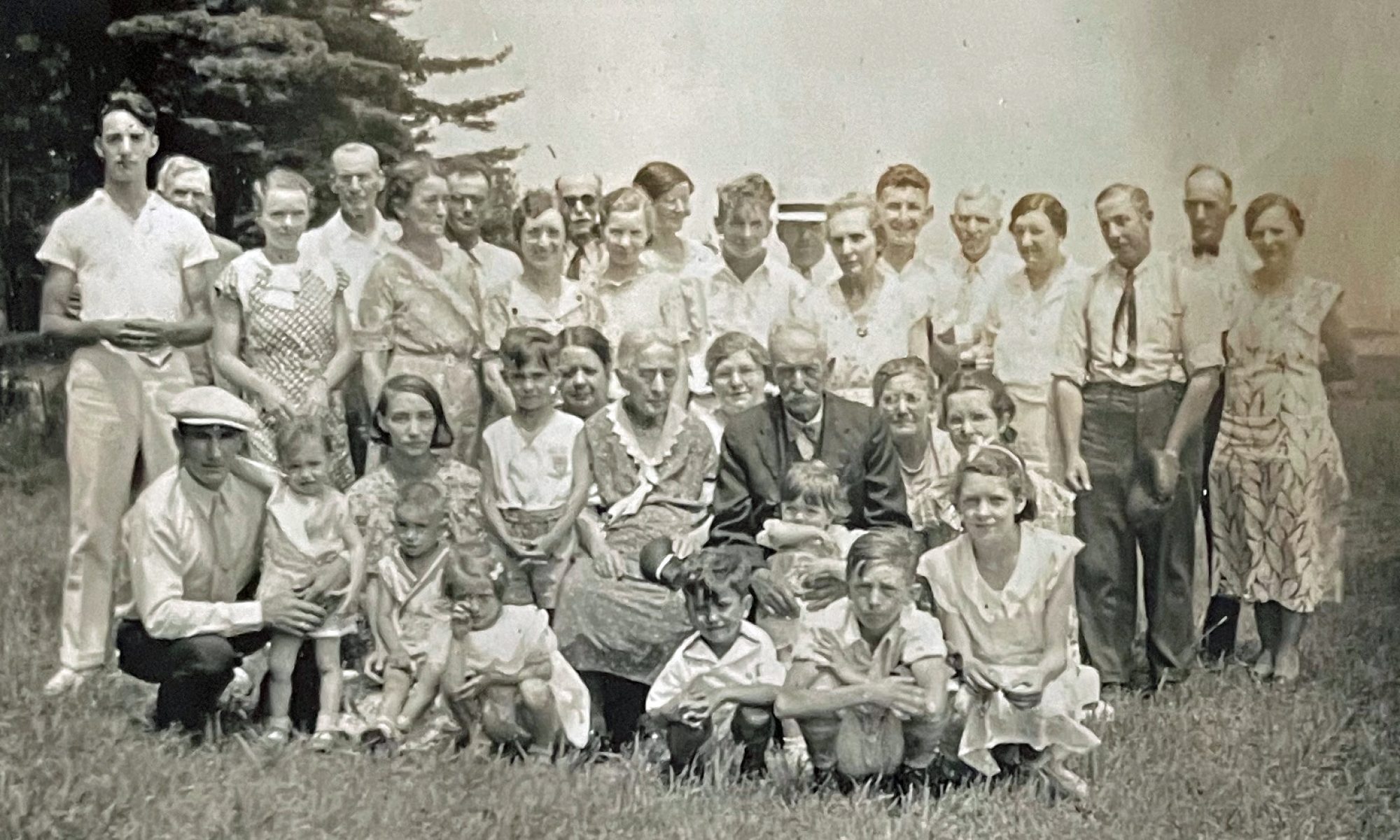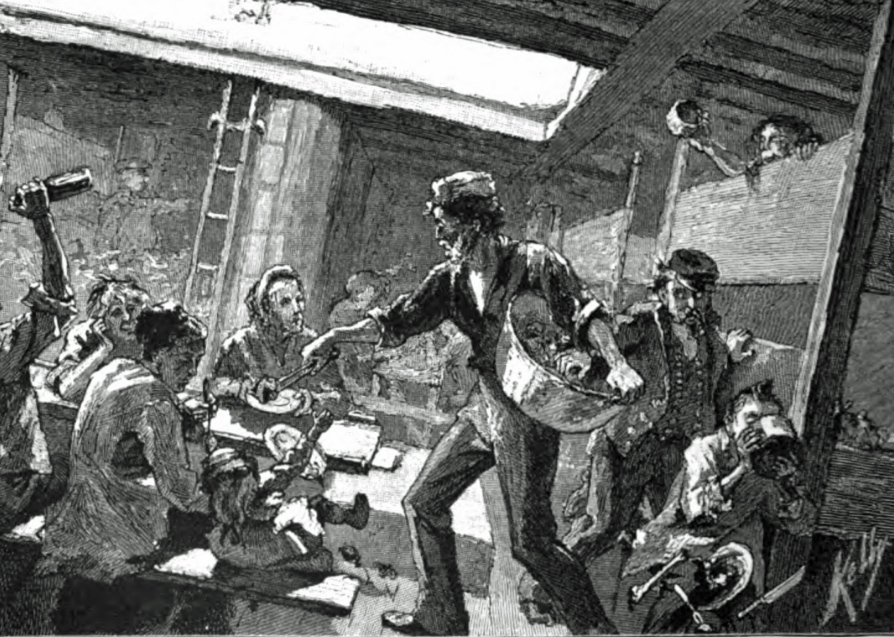The following are examples of a steerage ticket and regulations governing steerage passage from Le Havre to New York City in 1854.
Information on This Page is Associated with the Following Related Stories:
The Sperber & Fliegel Families in America: Catherine Fliegel the First to Arrive September 26, 2023
A German Influence July 11, 2023
The Fliegel Family: Their Journey to AmericaOctober 10, 2023
The examples below of the steerage ticket and conditions for travel reflect standardized terms and conditions that were probably utilized by various packet ship and steamship companies for most of the steerage travel from Le Havre, France. [1]
Aside from manifest ship lists, there are no records associated with the actual voyages of the Fliegel and Sperber family to the United States. The following examples of a steerage ticket and regulations for travel probably reflect the conditions under which members of the Fliegel family and Sperber family experienced when they immigrated to the United States in the 1850s from the German state of Baden.
The contract below was for one adult going from Le Havre to New York on the clipper ship “Admiral” of the Vanderbilt European Steamship Line dated 4 May 4, 1854. It was printed in French and German. The following is the translation of the contract:
Front of Steerage Passage Contract from 1854, Le Havre to New York
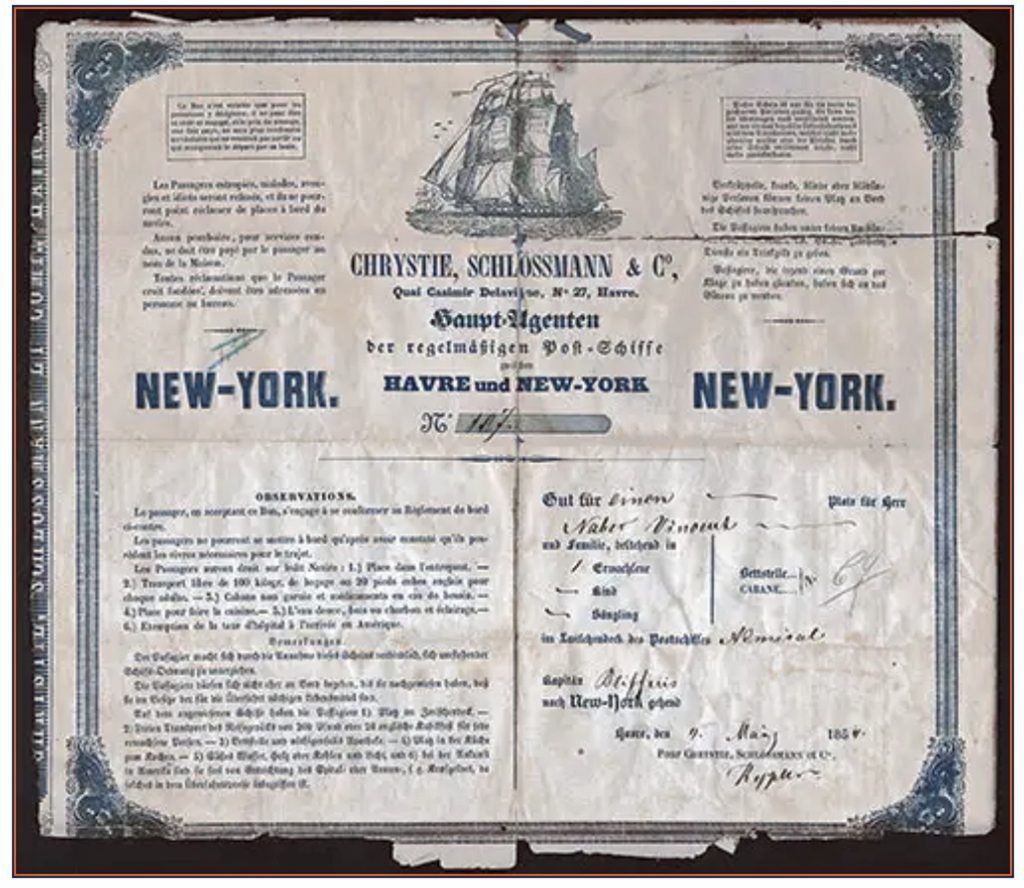
The following is the translation of the contract:
This voucher is only valid for the registered persons; it cannot be assigned or transferred, and the price of the passage, once paid, will not be refunded to the holder should he/she decide not to leave or miss the departure of the vessel.
Crippled, sick, blind and idiotic Passengers will be declined, and they will not be able to claim seats on the ship.
No tip, for services rendered, shall be paid by the passenger on behalf of the House.
Any claims that the Passenger believes are justified, must be addressed in person to the office.
NOTES:
By accepting this voucher, the Passenger agrees to comply with the following on-board Regulations. Passengers will not be able to board until they have found that they have enough food for the journey.
Passengers will be entitled to have onboard the said Ship:
1.) A place in steerage.
2.) Free carriage for each adult of 100 kilograms of luggage or 20 English cubic feet.
3.) Empty cabin space and medications in case of emergency.
4.) Place for cooking.
5.) Fresh water, wood or coal and lighting.
6.) Exemption from hospital tax upon arrival in America.
Regulations Governing Steerage Passage Contract in 1854.
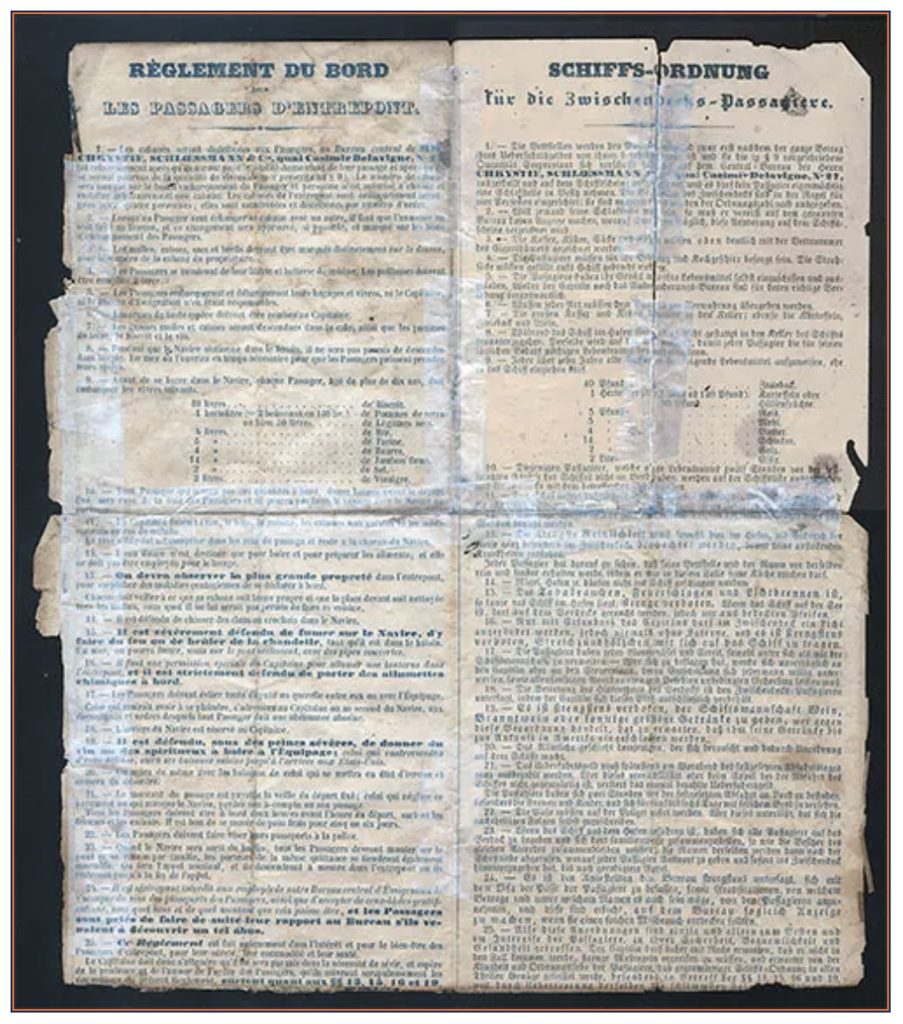
The following is the translation of the terms and conditions for travel:
1. The cabin space space will be assigned to Passengers, at the Central Office of MM. CHRISTIE, SCHOESSMANN & CIE., Quai Casimir Delavigne, No. 27, and this only after they have paid the full amount of their passage and after they have made use of the quantity of sea food prescribed in § 9 ).
The cabin space number will be indicated on the Passenger Boarding Pass and no one is allowed to arbitrarily choose and occupy a space. The cabins of Steerage ordinarily accommodate four persons; they are numbered and assigned by serial number.
2. When a Passenger wants to exchange his/her cabin space with another passenger, the request must be made to the Bureau, and this change must be approved if possible, and marked on the Passenger Boarding vouchers.
3. Trunks, crates, bags and barrels must be clearly marked on the top with the number of the owner’s cabin space.
4. Passengers must bring their bedding and cooking utensils. The benches must be filled on land.
5. Passengers must load and unload their baggage and food, neither the Captain nor the Emigration Office being responsible for such tasks.
6. Weapons of all kinds must be surrendered to the Captain.
7. The large trunks and crates will be lowered in the hold, as well as the potatoes, biscuits and wine.
8. While the Ship is at dockside, it is not allowed to go down into the hold. At sea, the hold will be opened at necessary time for Passengers to access their food.
9. Before boarding the Ship, each Passenger over the age of ten, shall load the following food.
- 40 pounds of biscuits.
- 1 hectoliter (= 2 bushels or 140 lb.) of potatoes or 30 pounds of dry vegetables.
- 5 pounds of Rice.
- 5 pounds of Flour.
- 4 pounds of butter.
- 14 pounds of smoked ham.
- 2 pounds of salt.
- 2 liters of Vinegar.
10. Any Passenger who does not have these quantities on board, twelve hours before departure fixed, will be removed from the list of Passengers and will not be able to travel with the departing Ship.
11. The Captain provides water, wood, kitchen, unfurnished cabin space (*) and medicines in case of illness. The hospital tax is included in the price of passage and remains the responsibility of the Ship.
12. Fresh water is only for drinking and for preparing food; and should not be used for washing.
13. The utmost cleanliness should be observed in the steerage to prevent contagious diseases from occurring on board. Everyone must ensure that their space is kept clean as well as the area in the front every morning, otherwise he/she would not be allowed to cook.
14. It is forbidden to hunt for nails or hooks from the Vessel.
15. It is strictly forbidden to smoke on the ship, to make fire, or to burn candles while the vessel is at dock. At sea, smoking is permitted, but only on the deck and with covered pipes.
16. Special captain’s permission is required to light a lantern in the steerage, and it is strictly forbidden to carry chemical matches on board.
17. Passengers must avoid any dispute or quarrel among themselves or with the Crew. Anyone who thinks he has cause to complain will address himself to the captain or second of the ship, to the provisions and orders of which every passenger owes absolute obedience.
18.. The stern of the ship is reserved for the captain.
19. It is forbidden, under severe penalties, to give wine or spirits to drink to the crew; passenger who disregard this security, will have his/her drinks seized until the arrival in the United States.
20. The same penalty shall be done to passenger with signs of drunkenness and cause disorder on the ship.
21. The amount of the passage is payable the day before the fixed departure; whoever neglects this payment or who misses the ship, will lose his account or his passage. All Passengers must be on board two hours before departure time, especially women and children. It is advisable to bring fresh bread for five or six days.
22. Passengers must have their passports stamped by the police.
23. When the Ship is out of the dock, all Passengers must get on deck and meet by family together with all members from the same receipt. Roll call will be made, and all will be dismissed to the steerage until the end of the call.
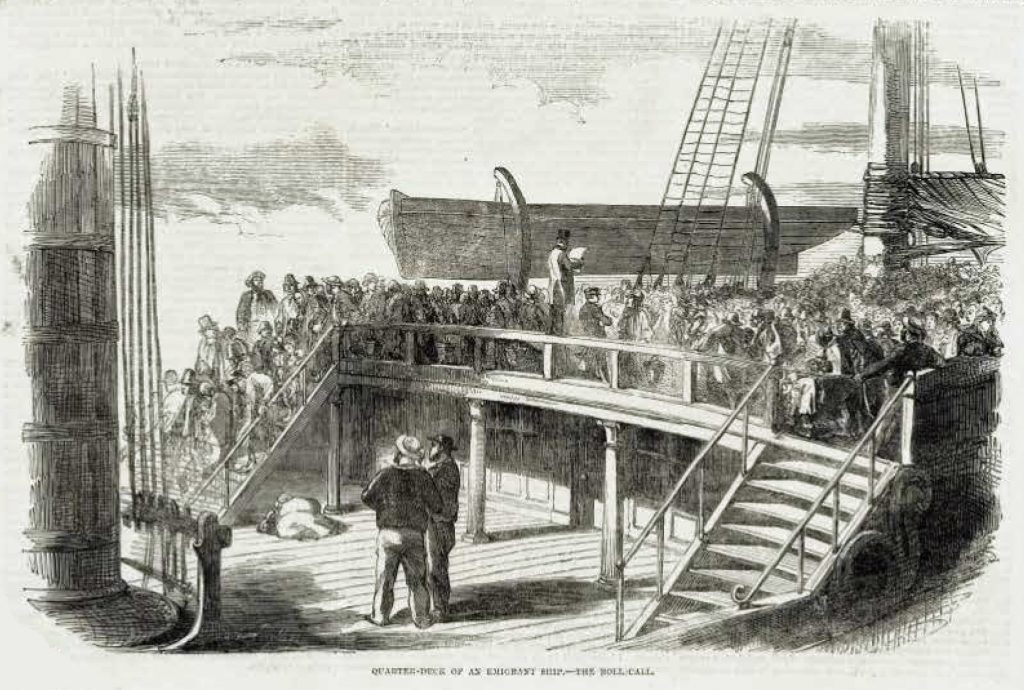
24. The employees of our Central Emigration Bureau are strictly forbidden to take care of Passengers’ Passport visas, and to accept any gratuities, regardless of which name and amount, and Passengers are asked to report back to the Bureau immediately if they discover such abuse.
25. These Regulations are made solely for the benefit and well-being of the steerage passengers for their safety, convenience and health.
The Captain expects that he will not be put in a position of ire, and hopes that passengers will follow scrupulously the dispositions of this Regulation, especially as to §§ 13, 15, 16 and 19
Sources
Feature Photograph: “Dinner in Steerage”, is a print drawing found in the Scribner’s Monthy, The Immigrant’s Progress, September 1877, Vol XIV, No. 5, New York: Scribner and Sons, 1877, Pages 577 – 588, https://babel.hathitrust.org/cgi/pt?id=mdp.39015011958363&seq=613
The 1877 magazine article , “Immigrant’s Progress”, describes the hypothetical story of the experience of an English immigrant coming to the United States 20 years after the voyage of the Fliegel family and John Sperber. The descriptive account of the voyage in the magazine article may still portray many of the life experiences witnessed by the Fliegel family and John Sperber in the 1850s. One notable exception is the Sperber and Fliegel families did not get processed through an immigrant processing center since they arrived prior to August 1855. They simply walked off the dock and went their way.
Scribner’s Monthly: An Illustrated Magazine for the People was an illustrated American literary periodical published from 1870 until 1881. Following a change in ownership in 1881 of the company that had produced it, the magazine was relaunched as The Century Magazine.
Wikipedia, Scribner’s Monthly, This page was last edited on 14 August 2022, https://en.wikipedia.org/wiki/Scribner%27s_Monthly
[1] The following is a summary of the passage contract.
- Date of Purchase / Voyage: 4 May 1854
- Steamship Line: Vanderbilt European Steamship
- Steamship: Clipper Ship “Admiral”
- Route: Le Havre to New York
- Ticket Type: Passage Contract
- Voyage Class: Steerage
- Name on Contract: Naber Vinceut (Vincerot?)
- Etnicity of Passenger: French
- Contract Terms: Translated from French to English
- Cost of Voyage: Not Stated
Source: Passage Contract – Le Havre to New York – 4 May 1854, Gjenvick Gjønvik Archives, https://www.ggarchives.com/Immigration/ImmigrantTickets/1854-05-09-SteeragePassageContract-LeHavreToNewYork.html
